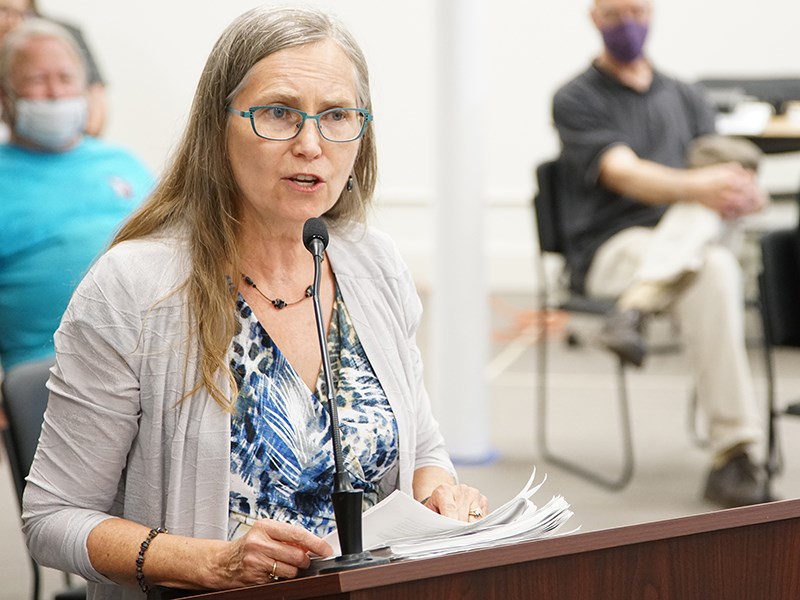City of Powell River Council has been asked to write correspondence to regulatory agencies regarding pesticide application by Western Forest Products in the Powell River region.
At the June 24 city council meeting, Sheryl McCumsey, speaking on behalf of Pesticide Free Powell River, said the organization believes the use of herbicides in forests needs to stop.
“We ask that you join us in making this change,” said McCumsey. “A herbicide is actually pesticide, which is the umbrella term that includes insecticides, fungicides, et cetera. Just because a pesticide is registered for use does not mean we should consider it. Nor does the fact that someone has spent a few hours getting a licence to spray mean we should use it either.”
McCumsey said if Western Forests is using so little pesticide, her organization asks two things: why not just stop using it then? Why not just let the trees grow or manually gird them? Where are the spray sheets that show exactly what, where, why and when spraying is occurring?
“You probably have thought about how Powell River is vulnerable to a forest fire in that we would have difficulty evacuating and/or even responding to a fire,” said McCumsey. “It is clear that fires are getting worse in BC. In fact, the largest areas burned in BC since 1950 have been in 2017 and 2018.
“So how does this fire risk have anything to do with our concern? Western Forest Products is a forestry company that has submitted a plan to the minister of environment in which they list many species of deciduous trees they view as pests. They state they could and they have in the past used herbicides to remove them.”
McCumsey said what is remarkable about this is how FireSmart videos suggest homeowners grow deciduous trees on their property and avoid planting conifers such as spruce, fir, pine and cedar as they are known to be far more flammable.
“Studies actually illustrate this-that aspen, maple, alder and other species are fire resistant,” said McCumsey. “Many times over, forest-fire fighters know this and will actually escape a fire by going to a stand of these trees that can prevent the spread and even stop a fire.”
McCumsey said councillors have probably heard of glyphosate, the active ingredient in Vantage, which is mentioned in this plan (or Roundup, as it is called in the store).
“This is one herbicide mentioned in the report that has had a fair amount of attention recently in regard to the well over 100,000 plaintiffs suing for their cancer they believed is a result of their exposure,” said McCumsey. “You might hear that lawsuits are not science; however, the cases are being won on the science that illustrates how links to cancer were deliberately hidden from view. The products which contain this herbicide have additives that also increase toxicity up to a thousand times.
“This is just one of many facts in how our assessments of pesticides are flawed, as the industry only provides science on the active ingredient, not the product itself. There is no better time to pay attention to how vulnerable we are, how we need to protect our water, the health of our forests and the wildlife within.”
McCumsey said her organization wants the minister of environment to hear that we “do not consent” to these pesticides in our forests.
“We ask you collectively, or as an individual, to say the same thing, as you represent us,” said McCumsey. “Currently the province mandates forest companies to practice in ways that are not sustainable. We need them [the province] to listen to make improvements as soon as possible. Quebec, for instance, discontinued spraying herbicides in forests in 2001.”
McCumsey said pesticides are not tools, they are poisons, which they do not consent to.
“They destroy perfectly good trees and upset diversity,” said McCumsey. “We cannot increase our fire risk by using them.”
McCumsey said Powell River has claimed a climate emergency and the BC government has claimed a state of emergency with COVID-19.
“As an isolated community, now is the time to make good decisions regarding the health and well-being of our community and surrounding ecosystem,” she said. “We are interconnected and not separate entities. We must use the precautionary principle and pay attention to independent science.
“Please represent us by writing a letter to the minister of environment and forestry and say you do not consent to spraying. This way, many of the risks are at least reduced and we can look forward to changing policies that would better suit the future of our community.”
During the question period, it was pointed out that Powell River does not test for pesticides in the drinking water. Mayor Dave Formosa said city staff could check into it.
In terms of a letter, council indicated it needed to review its policy regarding pesticides and its use of pesticides before writing a letter.
“We have work to do on this issue,” said Formosa, “before we do anything.”



